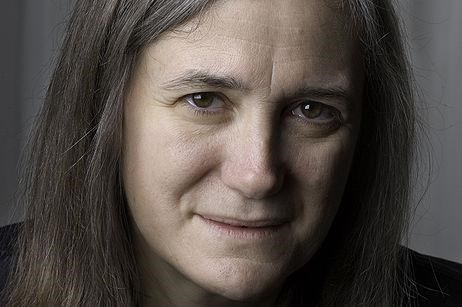Canadian border police drilled journalist on whether she would speak about the Olympics
The journalist is Amy Goodman, host of the syndicated and community-oriented radio and television program Democracy Now! At the end of November, she was travelling with two colleagues to Vancouver in Canada to give a talk at the local library about a new book. But they ran into trouble when they reached the border station. After showing their passports, the guard asked the journalists to leave their car and enter the border crossing building.
Inside Amy Goodman was questioned at length about the speech, she was going to give. She said that the she was going to talk about reforms of the health care system, climate change negotiations and the wars in Iraq and Afghanistan. And then the questioning became bizarre, as Amy Goodman relays in a column on the website Truthdig:
"Are you going to talk about the Olympics?" he asked.
I was puzzled. "Do you mean how President Obama recently travelled to Copenhagen to lobby for the Olympic Games to be held in Chicago?"
He shot back. "You didn't get those. I am talking about the Vancouver Olympics." Again, stunned, I said I wasn't planning to.
The guard looked incredulous. "Are you telling me you aren't going to be talking about the Olympics?" I repeatedly asserted that I was not."
All travellers risk secondary inspection
Meanwhile, other guards searched the journalists' car and computers, and the incident ended when the border guards issued the journalists with limited two-day visas as opposed to Canada's usual practice of allowing US citizens to visit Canada without a visa for up to six months.
In an e-mail statement to the Committee to Protect Journalists, a spokeswoman for the Canadian Embassy in Washington has confirmed that Amy Goodman was given a two-day visitor record, but the spokeswoman did not want to comment on whether the short term visa had anything to do with Amy Goodman's journalism. Instead the spokeswoman stressed that any traveller coming into Canada can be referred to secondary inspection:
"A number of risk-based indicators guide CBSA officers in making their decision to refer individuals for further examination or investigation. These indicators could include compliance history, specific information like a criminal record and behaviour of the traveller," the spokeswoman wrote to the Committee to Protect Journalists.
A chilling welcome to dissent?
Whilst the Canadian authorities do no want to confirm or deny that the incident had anything to do with the upcoming Winter Olympics in Vancouver, civil liberty organisations and critics of the Vancouver Olympics have little doubt that Amy Goodman's experience was part of a larger security scheme in the run-up to the Olympic Games.
Reporting under the headline "Amy Goodman and Canada's Olympic Paranoia", critical sports journalist Dave Zirin quotes Derrick O'Keefe, co-chair of the Canadian Peace Alliance:
"It is pretty unlikely that the harassment of a well-known and respected journalist like Amy Goodman about whether she might be speaking about the Olympics was the initiative of one over-zealous, bad apple Canadian border guard. This looks like a clear sign of the chill that the IOC and the Games' local corporate boosters want to put out against any potential dissent."
A few days after the incident, David Eby, executive director of the British Columbia Civil Liberties Association, explained on Amy Goodman's own show, Democracy Now, that it is quite common to see police and security forces in Canada targeting Olympic activists, but that it was surprising that Amy Goodman had been tied with in these issues.
"It is totally inappropriate that our Canadian border services would be harassing journalists in this manner. The chilling effect goes across the full spectrum of anyone who may wish to report on or criticize the Olympic Games to discourage them engaging in such activities," Eby said.






